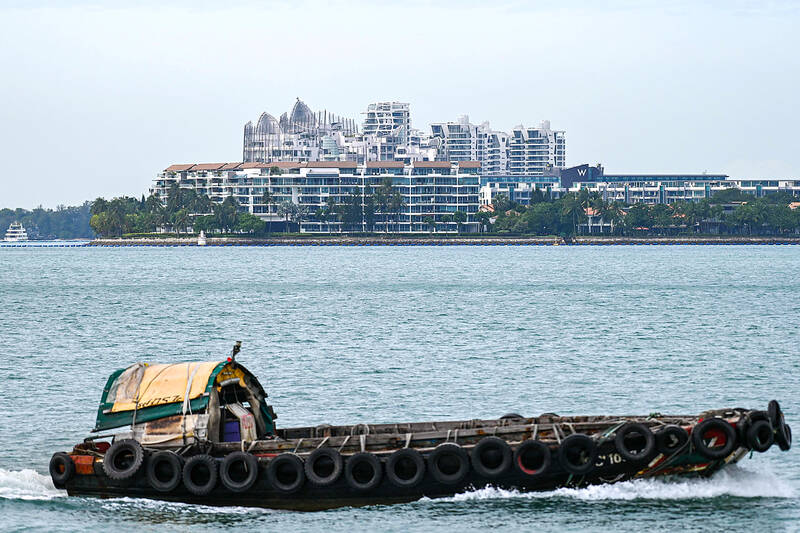Singapore is seeing an influx of ultra-wealthy families from China looking to protect their wealth from a government that increasingly views them with suspicion.
The Chinese Communist Party’s recent crackdowns on tech billionaires and tax-shy celebrities, as well as three years of “zero COVID” policies, have led many rich Chinese to look for a safe haven.
Nervous over the fate of their fortunes, some of the country’s mega-rich have since booked tickets to Singapore, insiders said.

Photo: AFP
The key Asian financial hub ticks all the boxes for relocating tycoons.
Singapore has been ruled by one party for the past six decades, and labor strikes and street protests are banned. Taxes are comparatively low and the population is predominantly ethnic Chinese.
The presence of recent Chinese arrivals is keenly felt in Singapore, with some relocating to luxury homes with waterfront views on Sentosa Island, which also has a theme park, a casino and a prestigious golf club.

Photo: AFP
“You cannot imagine the way they spend money. It’s crazy,” said Pearce Cheng (鐘貴添), CEO of AIMS, which provides immigration and relocation services.
He said he attended a client’s party where a rare Japanese Yamazaki 55 whisky, worth about US$800,000 a bottle, was served.
Cheng’s firm helps find luxury condos, hire chauffeurs and enroll kids in private schools. It once bought US$61,000 worth of cigars.
The new arrivals drive Rolls-Royces and Bentleys, and are often spotted at top-tier golf clubs such as the exclusive Sentosa Golf Club, where foreign members pay US$670,000 a year.
“Many of them are younger Chinese, in fashionable designer clothes, and they usually keep to themselves and dine amongst themselves, which is not surprising,” said Benny Teo, managing director of Blazon Pte Ltd, a consultancy specializing in golf.
Relocating to Singapore puts the wealth of China’s richest beyond the reach of Beijing, whose high-profile crackdowns have rattled billionaires.
Alibaba Group Holding Ltd (阿里巴巴) founder Jack Ma (馬雲), one of the most recognizable faces in Asian business, lost an estimated US$25 billion when Chinese regulators pulled the plug on a blockbuster initial public offering in 2020.
Other Chinese tycoons fear the government could apply similar pressure or even take over their businesses at low prices, an accountant familiar with the situation said.
“Moving to Singapore is about making sure the family wealth is kept safe and can last for several generations,” the accountant said.
Singapore is increasingly viewed as a home rather than just a backup plan, another source in the industry said, adding that clients had told him: “At least when I’m here, I know my money is mine.”
One of the founders of China’s largest hotpot chain, Haidilao (海底撈), recently set up a so-called family office in Singapore.
The number of family offices — wealth management companies dedicated to individual and group assets — rose from about 400 in 2020 to about 700 in 2021, the Monetary Authority of Singapore said.
Loh Kia Meng (劉家銘), cohead of private wealth and family office practices at law firm Dentons Rodyk, said that about 1,500 family offices would have been set up by the end of last year.
“I won’t be surprised if the total figure by the end of 2022 shows that one out of two new family offices originates from China,” Loh said.
The outflow is expected to continue even though China’s strict “zero COVID” policy and curbs have been lifted, analysts said.
Political tensions between Beijing and Washington are reinforcing the desire of some of China’s richest to move abroad.
Singapore is a “very handy neutral zone” where the mega-rich can do business, said Song Seng Wun (宋誠煥), a regional economist with CIMB Private Banking.
The city-state has deftly managed its relations with Washington and Beijing, maintaining close security ties with the US, while preserving robust trade links with China.
“Media attention on prominent wealthy individuals setting up family offices in Singapore cast the spotlight on our little island and stirred interest,” Loh said. “If the world’s rich are congregating in Singapore, why not me?”

WEAKER ACTIVITY: The sharpest deterioration was seen in the electronics and optical components sector, with the production index falling 13.2 points to 44.5 Taiwan’s manufacturing sector last month contracted for a second consecutive month, with the purchasing managers’ index (PMI) slipping to 48, reflecting ongoing caution over trade uncertainties, the Chung-Hua Institution for Economic Research (CIER, 中華經濟研究院) said yesterday. The decline reflects growing caution among companies amid uncertainty surrounding US tariffs, semiconductor duties and automotive import levies, and it is also likely linked to fading front-loading activity, CIER president Lien Hsien-ming (連賢明) said. “Some clients have started shifting orders to Southeast Asian countries where tariff regimes are already clear,” Lien told a news conference. Firms across the supply chain are also lowering stock levels to mitigate

IN THE AIR: While most companies said they were committed to North American operations, some added that production and costs would depend on the outcome of a US trade probe Leading local contract electronics makers Wistron Corp (緯創), Quanta Computer Inc (廣達), Inventec Corp (英業達) and Compal Electronics Inc (仁寶) are to maintain their North American expansion plans, despite Washington’s 20 percent tariff on Taiwanese goods. Wistron said it has long maintained a presence in the US, while distributing production across Taiwan, North America, Southeast Asia and Europe. The company is in talks with customers to align capacity with their site preferences, a company official told the Taipei Times by telephone on Friday. The company is still in talks with clients over who would bear the tariff costs, with the outcome pending further

Six Taiwanese companies, including contract chipmaker Taiwan Semiconductor Manufacturing Co (TSMC, 台積電), made the 2025 Fortune Global 500 list of the world’s largest firms by revenue. In a report published by New York-based Fortune magazine on Tuesday, Hon Hai Precision Industry Co (鴻海精密), also known as Foxconn Technology Group (富士康科技集團), ranked highest among Taiwanese firms, placing 28th with revenue of US$213.69 billion. Up 60 spots from last year, TSMC rose to No. 126 with US$90.16 billion in revenue, followed by Quanta Computer Inc (廣達) at 348th, Pegatron Corp (和碩) at 461st, CPC Corp, Taiwan (台灣中油) at 494th and Wistron Corp (緯創) at

NEGOTIATIONS: Semiconductors play an outsized role in Taiwan’s industrial and economic development and are a major driver of the Taiwan-US trade imbalance With US President Donald Trump threatening to impose tariffs on semiconductors, Taiwan is expected to face a significant challenge, as information and communications technology (ICT) products account for more than 70 percent of its exports to the US, Chung-Hua Institution for Economic Research (CIER, 中華經濟研究院) president Lien Hsien-ming (連賢明) said on Friday. Compared with other countries, semiconductors play a disproportionately large role in Taiwan’s industrial and economic development, Lien said. As the sixth-largest contributor to the US trade deficit, Taiwan recorded a US$73.9 billion trade surplus with the US last year — up from US$47.8 billion in 2023 — driven by strong